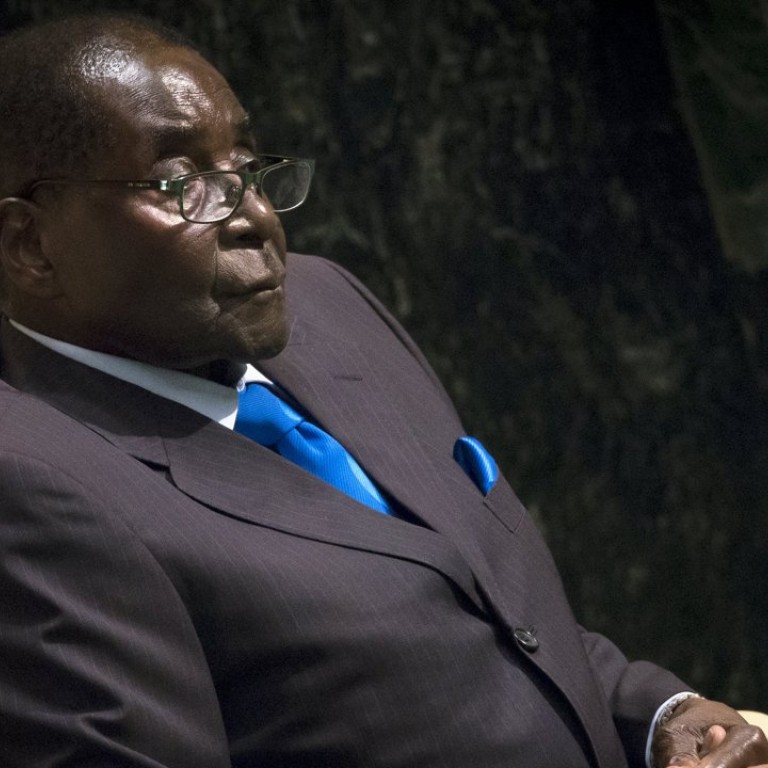
Getting the politics of prize-giving right
Confucius Peace Prize chairman lauds Mugabe for injecting ‘fresh energy’ into global quest for harmony
Two little black boys lived over the hedge between our houses in the middle of Africa. It was in the middle of the sprawling campus of the University of Rhodesia and the Chavundukas and I used to spend our time kicking rugby balls over the hedge and hurling cricket balls at each other. It was a glorious existence being 10 years old in the sixties, with happy memories of bikes, bush, blue skies and freedom.
One of the boys who came round was Mark Chavunduka. Mark founded a Sunday paper in Zimbabwe championing media freedom and exposing economic mismanagement, corruption and repression in the country.
He was too successful, and was detained and tortured in a way that cannot be described in a family newspaper except to say that before they were released they were made to roll in wet grass to clean the blood from their bodies. Mark died three years later at the tender age of 37.
Flying into Harare shows a scene of devastation caused by greed and neglect
It comes as a surprise then to see that this year’s award of the Confucius Peace Prize, the self-appointed Chinese version of the Nobel Peace Prize, went to the man who defied his own Supreme Court judges when asked to release Mark.
Qiao Damo, the poet and committee chairman, announced Zimbabwean President Robert Mugabe, 91, was their choice saying: “if Zimbabwe did not have Mugabe as its president, the country would be facing great difficulty,”
Mugabe had “injected fresh energy” into the global quest for harmony, arguing that Mugabe had provided his people with a better standard of living than the citizens of Syria, Iraq, or Afghanistan. “It’s much better than Libya too” – top marks then.
Rhodesia in the sixties was the breadbasket of Africa, with huge earnings from arable crops and tobacco, and a highly productive mining industry. Mugabe brutally redistributed land belonging to whites, giving it to favoured cronies who had no use for it.
Flying into Harare shows a scene of devastation caused by greed and neglect, with hundreds of square kilometres of fallow farmland, crumbling irrigation ditches, rusty equipment creaking in the wind, and kilometre after kilometre of wooden frames, collapsed and idle, that were used to dry tobacco. Zimbabwe now has to spend precious foreign currency to import food.
I returned to my old school in 2010, to find that parents were now privately funding schools because the education budget had been frittered on ministerial lifestyles. Families would chip in to educate one bright little boy to represent the whole family. Such resilience in the face of hardship makes one proud for their sacrifice.
The Zimbabwean dollar suffered from such hyperinflation that the US dollar has now replaced it. I bought a 100 trillion Zim dollar note – for 50 US cents. In 1980, the average annual income in Zimbabwe was US$950, 23 years later it had dipped below US$400. In 1990, the life expectancy was just 64 years; extraordinarily, it is now the lowest globally – 37 for men and 34 for women.
Mugabe destroyed a squatter area in Harare in 2005, leaving 10,000 people homeless in “Operation Murambatsvina” (Drive out the rubbish).
One of Confucius’ sayings is to never impose on others what you would not choose for yourself. Who would want to live in Mugabe’s homeland today?
Good politics in terms of prize-giving must provide a positive profile for the giver. This is why Mandela and De Klerk, Gorbachev and Reagan were worthy Nobel Peace Prize winners, because they fought against their upbringing and instincts to bring peace for many. This award benefited neither the prize givers, nor China, nor indeed even Mugabe, who rejected the prize on hearing that it was not given by the Chinese government.
Politically inspired international prize-giving is an opportunity to embarrass your opponents by showing yourself to be wise, humble and magnanimous. Honour someone on their side that annoys them. They must be not too connected with the Western establishment, be a bit of a dissident, and must have some popular respect. A deliberate act of betrayal disqualifies a candidate, which rules out Edward Snowdon, a disaffected adolescent with a gripe against his workplace.
There is one man who embarrassed the West and gave us all much amusement as we eavesdropped on the high and mighty. Step forward Julian Assange, the publisher of Wikileaks, from his diplomatic sanctuary in the Ecuadorian embassy in London.
A good choice and within the rules; but really, shouldn’t prizes be given to the local hero who stands up for the little guy? Perhaps someone society needs – like Mark Chavunduka.
Richard Harris is chief executive of Port Shelter Investment Management

